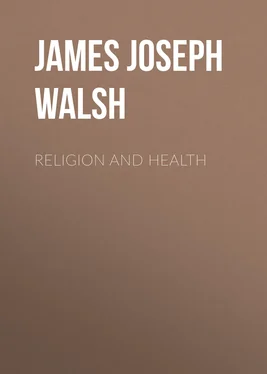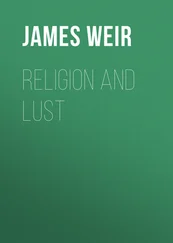James Walsh - Religion And Health
Здесь есть возможность читать онлайн «James Walsh - Religion And Health» — ознакомительный отрывок электронной книги совершенно бесплатно, а после прочтения отрывка купить полную версию. В некоторых случаях можно слушать аудио, скачать через торрент в формате fb2 и присутствует краткое содержание. Жанр: foreign_prose, foreign_religion, Здоровье, foreign_antique, на английском языке. Описание произведения, (предисловие) а так же отзывы посетителей доступны на портале библиотеки ЛибКат.
- Название:Religion And Health
- Автор:
- Жанр:
- Год:неизвестен
- ISBN:нет данных
- Рейтинг книги:4 / 5. Голосов: 1
-
Избранное:Добавить в избранное
- Отзывы:
-
Ваша оценка:
- 80
- 1
- 2
- 3
- 4
- 5
Religion And Health: краткое содержание, описание и аннотация
Предлагаем к чтению аннотацию, описание, краткое содержание или предисловие (зависит от того, что написал сам автор книги «Religion And Health»). Если вы не нашли необходимую информацию о книге — напишите в комментариях, мы постараемся отыскать её.
Religion And Health — читать онлайн ознакомительный отрывок
Ниже представлен текст книги, разбитый по страницам. Система сохранения места последней прочитанной страницы, позволяет с удобством читать онлайн бесплатно книгу «Religion And Health», без необходимости каждый раз заново искать на чём Вы остановились. Поставьте закладку, и сможете в любой момент перейти на страницу, на которой закончили чтение.
Интервал:
Закладка:
Sir Samuel Wilks, another of the presidents of the Royal College of Physicians and distinguished in many other ways among the physicians of Great Britain, in his Harveian Oration expressed himself very definitely in this matter of the relations of science and religion, and his quotation from our own Oliver Wendell Holmes adds to the interest of what he has to say.
"Hear what a learned professor of anatomy, Wendell Holmes, can say: 'Science represents the thought of God discovered by man; by learning the natural laws he attaches effects to their first cause, the will of the Creator', or in the poetic language of Goethe: 'Nature is the living garment of God.'
"Science conducts us through infinite paths; it is a fruitful pursuit for the most poetic imagination. We take the world as we find it and endeavor to unravel its mysteries; but the Alpha and Omega we know not. Enough for us to look at what is lying around us; it is a part we see and not the whole, but we can say with the poet, 'We doubt not, through the ages one increasing purpose runs.'"
Professor Sims Woodhead, well known as one of the distinguished contributors to pathology in the nineteenth century and who was, before being professor of pathology at Cambridge the director of the Laboratories of the Conjoint Board of the Royal College of Physicians (London) and Surgeons (England) may very well be taken as a representative of the medical scientists of the last generation of the nineteenth century. It has been said that where there are three physicians there are two atheists, and perhaps this may be true among the smaller fry of the profession, but it certainly is not among the most distinguished members of it. Such men as Pasteur, Lord Lister, Robert Graves, Corrigan, Laënnec, Claude Bernard, Johannes Müller, are the outspoken contradiction of it. Pathology and anatomy, in both of which subjects Professor Woodhead was a teacher, are often said to be rather serious in their inroads on the faith of the men who pursue them closely. Professor Woodhead is on record categorically with regard to this subject of the relations of the Bible and religion, and science and religion, and his words are well worth while quoting here.
"As regards the statement that 'recent scientific research has shown the Bible and Religion to be untrue', nothing is further from the real fact; the more the Bible is tested the more it is found to be made up of historical documents. Moreover, it is recognized that the Bible, as a record of truths, never falls foul of Science in its search after truth, and scientific men are too true to themselves to take the stand that they will not accept truth of any kind.
"I agree with you that certain theories put forward in the name of Science may be opposed to certain theological dogmas; but men are certainly coming to see that between the facts of Science and the essential teachings of the Christian religion there is never any real opposition; and by the 'Christian Religion' I mean the religion of Christ, not what some people have wished to read into it; and by 'science' I mean a search for truth and knowledge, and by 'men of science' I mean men engaged in that search."
Professor John W. Taylor, one of the distinguished physicians of Great Britain and president of the British Gynecological Society, summed up the answer to the question "Can We Still Believe?" in words that show how devout a great medical scientist can be:
"What can we 'hold by' as Christians? We can hold by the Faith of the early Apostles as enunciated in the Apostles' and the Nicene Creeds, and plainly foreshadowed in 1 Cor. xv. This was written within thirty years of our Lord's crucifixion and must have been 'received' by St. Paul immediately on his conversion." Any one who will turn to that chapter of First Corinthians will find that it contains all the essentials of Christian faith, yet here is a great modern physician finding in it the expression of his own mental attitude toward religion in our time.
Biologists, in spite of popular impressions to the contrary, have paralleled physicians in this regard. To cite but one or two:
Professor George Romanes, who was considered not alone one of the leaders of scientific thought in England, but one of the foremost naturalists of modern times, after expressions as a younger man that showed his deep and even devout belief in religion, wrote somewhat later a defense of atheism on scientific grounds. Some years afterwards, in the maturity of his powers, he prepared a thorough-going recantation of this in the shape of a work designed to show the fallacy of his former atheistic views, in which he said:
"It is a general, if not a universal rule that those who reject Christianity with contempt are those who care not for religion of any kind. 'Depart from me' has always been the sentiment of such. On the other hand, those in whom the religious sentiment is intact, but who have rejected Christianity on intellectual grounds, still almost deify Christ. These facts are remarkable."
"Unbelief," Professor Romanes concluded, "is usually due to indolence, often to prejudice, and never a thing to be proud of."
In every department of science one finds the representatives of the various branches of scientific study in harmony on this subject of religion and science. Professor George Boulger, whose work has been mainly done in botany and who was a fellow of a number of the scientific societies of England and vice-president of the Selborne Society, has some very direct expressions in the matter that add to the significance of what has been said by others.
"In philosophy, in physics, and in astronomy I am content to place myself on the side of Bacon, of Newton, of Napoleon. I believe, with Bacon, that 'a little Philosophy inclineth Man's Minde to Atheisme; but depth in Philosophy bringeth Men's Mindes about to Religion.' With Newton I am content to 'seem to have been only like a boy playing on the seashore, and diverting myself in now and then finding a smoother pebble or a prettier shell than ordinary, whilst the great ocean of truth lay all undiscovered before me.' With Napoleon—not a man of science but a man of the world, a man of action—I would say to our neo-Epicureans as he did to his sceptical officers, pointing to the stars, 'Gentlemen, you may talk all night, but who made all these?'"
He recognized how many difficulties there might be for the scientist, but felt, as Cardinal Newman once said, that hundreds of difficulties may not make a single doubt. Professor Boulger has dealt with some of these cruder difficulties with trenchant directness.
"I am perfectly aware of the temptation of the physiological laboratory, when one is face to face with the facts of the localisation of brain-functions and the influence of purely physical conditions upon mentality, until one is almost led to Buchner's gross misstatement that 'the brain secretes thought as the liver secretes bile'; but here, as ever, it is at the very base of the problem that the unsolved mystery shows itself insoluble. Force, Matter, Life, Thought, Will,—what are they, whence come they? Science deals with their phenomena, their manifestations. With John Ray I would term the study of nature a pious duty, one suited to a Sabbath day and not improbably one of the main occupations of the endless Sabbaths hereafter.... But true science will never presume to say that it can deal with anything beyond these phenomena. As I am as convinced that the Christian Faith is a Divine revelation as I am that 'Nature' is the creation of the Divine First Cause, it is, of course, to me unthinkable that there could be any conflict between them."
Not only the scientists themselves but the philosophic students of the whole range of modern thought who took the information imparted by the specialists and coordinated it for the purpose of finding the philosophic conclusions to be drawn from it all as to man's life and destiny and the meaning of it all have recognized the place of religion in Life and its significance for humanity.
Читать дальшеИнтервал:
Закладка:
Похожие книги на «Religion And Health»
Представляем Вашему вниманию похожие книги на «Religion And Health» списком для выбора. Мы отобрали схожую по названию и смыслу литературу в надежде предоставить читателям больше вариантов отыскать новые, интересные, ещё непрочитанные произведения.
Обсуждение, отзывы о книге «Religion And Health» и просто собственные мнения читателей. Оставьте ваши комментарии, напишите, что Вы думаете о произведении, его смысле или главных героях. Укажите что конкретно понравилось, а что нет, и почему Вы так считаете.












